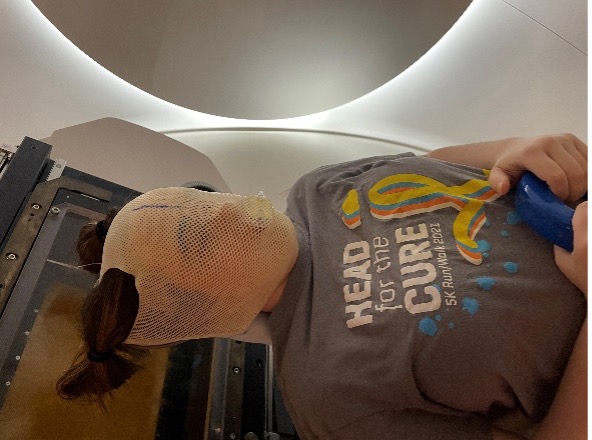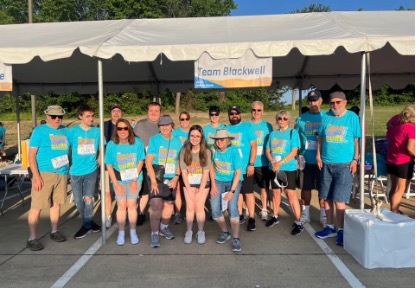September 5, 2023
A Childhood Interrupted by Brain Cancer









Previous
Next
Written by Anna Blackwell, Ganglioglioma survivor and Ambassador for Childhood Cancer Awareness Month
For as long as I can remember, I have woken up with daily morning headaches. At five years old, I would wake up, watch cartoons until the headache went away, and then get ready for school. At eight years old, I was told my headaches were allergy related, and Zyrtec would take away all my problems. At nine years old, I started getting debilitating daily migraines towards the end of the school day. After taking Advil daily to reduce my daily symptoms, I was shrugged off by yet another doctor, told I was merely addicted to Advil and the withdrawal was what was causing my headaches.
At eleven years old, my appendix ruptured around my femoral nerve and caused excruciating nerve pain down my right leg for months to come. This was the first case the general surgeon at Children’s Hospital had ever seen, so nobody knew what to do for the pain or how long it would last. My mom and I ended up going to twenty-seven different doctors in ten months to find an answer for my headaches and nerve pain, with no answers or solution. At one point, I even asked a neurologist if the pain could be related to a brain tumor; I was immediately shut down, laughed at for my ridiculous question, and told that the pain would go away over time.
At twelve years old, my family went to the local arcade and played the Pop-A-Shot basketball game. After we were done playing, I turned to leave and knocked down my brother’s cup of tokens. As we were picking the tokens up, I apologized, claiming I never saw them. My mom, looking confused, said the tokens were right in front of me, right in my line of sight.
A few days later, we went to the optometrist, where they had me do countless eye exams, including a field vision test. At the end of the exam, we found out I was missing the peripheral vision in the right half of both of my eyes: I had homonymous hemianopia. Two days later, I went in for a brain MRI that confirmed our worst fears: I had a ganglioglioma (slow-growing brain tumor) the size of a golf ball.
I had brain surgery two weeks later, where 90% of the tumor was removed. After the surgery, the daily morning headaches became less and less excruciating, but life became much more difficult to navigate. At twelve years old, I was told I would never get my vision back: the optic nerve was damaged by the tumor, and no matter how much time passes, I will never be able to see anything to the right of a dot. The surgery also caused comprehension problems: I went from reading at a college-level to barely being able to read If You Gave a Mouse a Cookie. I also lost strength in the right side of my body, unable to walk without a severe limp or hold a pencil. My life had turned upside down.
At thirteen years old, I struggled to cope with what I had lost and with what I was left with. I searched for any sense of control and became obsessed with numbers, whether it be grades or my weight. I entered eighth grade six months after my brain surgery and came home every night to do five hours of homework/assignments. I was unable to read on my own, so my mom read every book and assignment out loud to me while I tried to comprehend basic sentences. After countless hours of work, I maintained all A’s. The stress of maintaining the perfect grades caused me to spiral into counting calories, where I developed an eating disorder and lost thirty-five pounds in three months.
I was so focused on not letting the tumor affect me and my successes to where I repressed all the raw emotions that came along with childhood cancer: grief, anger, envy, guilt. The continuous stress of maintaining perfection, whether it be with numbers or by upholding this persona of being an “inspiration,” caused me to spiral even more, where I started having anxiety-induced seizures. I could not make it to school without having an episode; I could barely make it to class once a week. I eventually had to go homebound that spring semester and had a chance to process everything I had just been through.
At fourteen years old, I started to accept that I was not the “kid with cancer” but instead the “kid who beat cancer.” I started to branch out and share my story, connecting with organizations like Head for the Cure. In 2018, my family and I participated in our first 5K in North Texas, where we were taken aback by how many people were impacted by brain cancer. For the first time in two years, I felt like I was not alone.
At fifteen years old, I participated in my second 5K three weeks before my “sweet sixteen.” For the past year, I had watched all my classmates get their permits and driver’s licenses. For the past year, I had been reminded that, because of my vision loss, driving seemed like an unattainable goal. At the time, I was in vision therapy five hours a week, where I learned how to scan and sense objects in my missing field. I trained my eyes with a Peli Lens, which adjusted my eyes to scan more with my left peripheral.
At sixteen years old, I started taking lessons at a driver’s rehabilitation program that specifically trained people with disabilities on how to drive safely. I had also started in physical therapy, finally ready to conquer my right-sided weakness and get it back to where it was before the surgery.
At seventeen years old, I got my strength back in my right arm and leg: I could walk without a limp, I could hold a pencil. I completed forty hours of continuous training on scanning and driving safely. I was cleared to get my driver’s license. I had taken my first college-level class and was able to read at a college-level for the first time in five years. At seventeen years old, I finally had my independence.
At eighteen years old, I truly felt like I had beat brain cancer and its side effects. I graduated high school with a 4.0 GPA, top 3% of my class. I raised over $10,000 for brain cancer research through Head for the Cure. I got into my dream college, SMU, and secured two internships within the first two months of being on campus. All seemed good, until the limp started coming back. I fell out of my chair twice, stumbled into a tree. I started missing classes for headaches. I nearly passed out walking to class. That same year, I found out my brain tumor was growing back, and a brain cyst had developed in the cavity. I had brain surgery to insert an Ommaya reservoir to manually drain the cyst and did thirty rounds of proton therapy in the spring. The emotions came flooding back; I had hit a new low.
At nineteen years old, I gave myself time to process the recurrence: having to make the decision on which treatment option would cause the least amount of side effects in thirty years, coping with new side effects like memory loss and lowered processing speeds, jealousy towards those who have a normal childhood and college experience. By grieving, I allowed myself to look forward, with an added drive to find a cure for brain cancer through Head for the Cure. Yet again, all seemed good, until the limp came back. I could no longer hold a pencil. I had excruciating neck and shoulder pain, crying myself to sleep nearly every night.
At nineteen years old, I found out the brain cyst was growing back. The Ommaya reservoir we had previously inserted did not work when trying to drain the cyst, and I needed another surgery. After the surgery and cyst drain, I could feel my arm and leg again, and I had so much more energy; I was back to my normal self. And then the symptoms started up and the cyst filled back up a month later, and then again a month later, and then again a month later…
I am twenty years old now. I had the most recent cyst drain five days ago, with over 150ml of cystic fluid drained out of my brain to date. The cyst fills to the size of a golf ball within two weeks and starts causing side effects like complete loss of feeling in my right side, daily morning headaches, and fatigue within five days. The doctors do not know when or if this will stop filling, or if the side effects are fully reversible.
For as long as I can remember, I have woken up with daily morning headaches. For the foreseeable future, I will wake up with daily morning headaches. Brain cancer robbed me of my childhood. Instead of being caught up in teenage drama, I was caught up in wondering if I was going to be alive in a month or what life would be like if every day was not an uphill battle.
No kid should have to go through what I went and am still going through. Kids deserve to be kids, and that’s why Childhood Cancer Awareness Month means so much to me. Because although reading stories like mine will not prevent 13 kids in the US from being diagnosed with brain cancer tomorrow, it will open an eye to the dire need of finding a cure. It will raise awareness to not be dismissive of symptoms, and to keep advocating for yourself and your child: if we had believed my headaches were just from allergies or that they would go away over time, who knows if I would be sharing my story with you today.
I am forever grateful for the doctors who listened, for my mom for being my advocate, and for Head for the Cure for giving me a voice when brain cancer tried to strip me away of one. Together, we will find a cure.